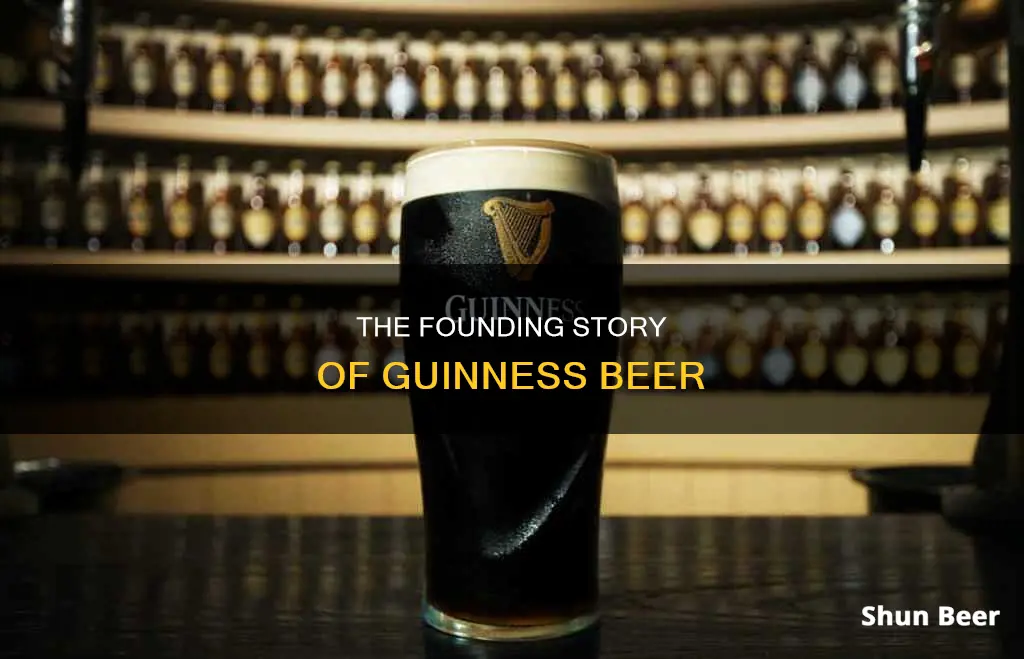
Guinness, one of the world's most recognisable beer brands, was founded in 1759 when Arthur Guinness signed a 9,000-year lease on the St. James's Gate Brewery in Dublin, Ireland.
| Characteristics | Values |
|---|---|
| Year founded | 1759 |
| Founder | Arthur Guinness |
| Location founded | Dublin, Ireland |
| Brewery founded in | St. James's Gate Brewery |
| Length of lease signed | 9,000 years |
| Annual rent | £45 |
What You'll Learn

Arthur Guinness signed a 9,000-year lease for the brewery in 1759
On December 31, 1759, Arthur Guinness signed a 9,000-year lease for the St. James's Gate Brewery in Dublin, Ireland. The lease was for a four-acre property with an annual rent of £45. The lease granted him the use of a limited water supply. When the Dublin Corporation tried to cut off the water supply due to overuse, Guinness was said to have violently rushed upon them, wrenching a pickaxe from one of them and declaring "with very much improper language" that they should not proceed.
The St. James's Gate Brewery was a success, and by 1769, Guinness began exporting his ale to England. He started brewing porter in the 1770s, which was so popular that he decided to stop brewing ale and focus entirely on the creamy stout. One of his most popular offerings was an export beer called West Indies Porter, a predecessor of today's Guinness Foreign Extra Stout.
The brewery was passed on to Guinness's son, Arthur Guinness II, who maintained and grew the business. By 1838, the St. James's Gate Brewery had become the largest brewery in Ireland. It was then passed on to Arthur II's son, Benjamin Lee Guinness, in the 1850s. Benjamin spread the fame of Guinness's stout overseas, and by 1886, the company was the world's largest brewery.
Today, Guinness is one of the most successful alcohol brands worldwide, brewed in almost 50 countries and available in over 120. It is known for its distinctive flavour and colour, derived from the porter-style beer that originated in London.
Guinness and Breastfeeding: To Pump or Not?
You may want to see also

Guinness Extra Stout is based on an 1821 recipe
The history of Guinness beer began in 1759 when Arthur Guinness signed a 9000-year lease on St. James's Gate Brewery in Dublin, Ireland. In 1769, Guinness first exported his ale to Great Britain, and in 1778, he began selling dark beer porter. However, it was not until 1821 that the foundation for the Guinness Extra Stout was laid.
Guinness Extra Stout is based on a beer first brewed in 1821 when Arthur Guinness II, the son of Arthur Guinness, set down precise instructions for brewing his Superior Porter. This beer was sharp and crisp in taste and had the trademark Guinness flavours at its core. It was also subtly fruity with warming, roasted notes of coffee and dark chocolate.
The recipe created by Arthur Guinness II has evolved over the years, with Guinness Extra Stout becoming a beloved icon around the world, especially in West Indian, West African, and Caribbean communities. It has a rich history and robust flavours that make it perfect for celebrations, whether enjoyed ice-cold in a pint glass or as an ingredient in a special dish.
The Extra Stout is crafted from the finest quality malt, hops, and Irish barley. It has a distinctively black full-bodied liquid with a rich creamy head. The aroma is medium and balanced with a roast character and subtle fermentation fruitiness. The flavour is a perfect balance of bitter and sweet, with a smooth finish.
Guinness Extra Stout has played a significant role in the success of the Guinness brand, which is now one of the most successful alcohol brands worldwide. It is brewed in almost 50 countries and available in over 120, with a strong presence in Africa, where about 40% of worldwide total Guinness volume is brewed and sold.
Guinness Beer: Healthy or Harmful?
You may want to see also

The company was incorporated in 1886
By the time of the company's incorporation, Guinness was already an international brand and the largest brewery in the world. In 1901, a laboratory was established to improve the brewing art through a more scientific approach.
In the 1890s, a group of men set sail around the world to ensure that Guinness was being shipped, stored, and served in quality conditions. They travelled from South Africa to Australia, China to Brazil, enduring stormy seas to quality-test the beer.
In 1886, Guinness was the largest brewery in the world, averaging sales of 1.138 million barrels a year. Despite the brewery's refusal to advertise or offer its beer at a discount, the company was valued at £6 million, and shares were 20 times oversubscribed.
The company's incorporation in 1886 was a significant step in the history of Guinness, marking its transition from a successful family business to a global enterprise.
Guinness Beer: High-Fructose Corn Syrup Content Explored
You may want to see also

Guinness merged with Grand Metropolitan in 1997 to form Diageo
In 1997, Guinness plc merged with Grand Metropolitan to form Diageo plc, a London-based multinational alcoholic drinks producer. The merger created the largest drinks company in the world, capitalised at about 40 billion euros.
Grand Metropolitan was a UK-based international hotel and catering conglomerate, founded in 1934 as a hotel business called MRMA Ltd. The company diversified into catering, dairy, and gambling, and in 1972 it moved into brewing by purchasing two UK breweries, including Watney Mann, which owned International Distillers & Vintners. This purchase made Grand Metropolitan a major player in the Scotch whisky world.
Guinness, on the other hand, was founded in 1759 by Arthur Guinness in Dublin, Ireland. It became the largest brewery in Ireland in 1838 and the largest in the world by 1886. In 1932, Guinness moved its headquarters to London due to the Anglo-Irish trade war.
The merger of Guinness and Grand Metropolitan was not without controversy. Due to the backlash, Guinness was maintained as a separate entity within Diageo, retaining the rights to the Guinness brand and associated trademarks.
Today, Diageo is a British-based multinational alcoholic beverage maker, with Guinness brewed in almost 50 countries and available in over 120. Guinness remains one of the most successful alcohol brands worldwide.
Crafting Guinness Beer: A Step-by-Step Guide to Brewing Perfection
You may want to see also

Guinness has a huge following in Africa
The first recorded shipment of Guinness to the African continent arrived in Sierra Leone in 1827. The beer was renamed Foreign Extra Stout from around 1849 onwards. The first Guinness brewery outside of Ireland and the United Kingdom was established in Ikeja, Nigeria, in 1962.
The popularity of Guinness in Africa can be attributed to several factors. One reason is that Guinness followed the routes created by the British Empire, which provided access to new markets and consumers. Additionally, the beer was specially brewed to survive long sea journeys, making it ideal for export and giving it a competitive advantage in overseas markets. The unique taste and higher alcohol content of Foreign Extra Stout, which is brewed directly within the country, also contribute to its popularity in Africa.
Guinness has continued to innovate and adapt to the African market, such as with the introduction of Guinness Smooth, a smooth and distinctive beer with the perfect balance of flavour. The company has also invested in local communities and contributed to philanthropic initiatives, further solidifying its presence and reputation in Africa.
With its strong sales and dedicated consumer base, Guinness has become an integral part of the African beer market and will likely continue to be a leading brand in the region.
Guinness Beer: Wheat-Free, But What's the Secret?
You may want to see also
Frequently asked questions
Guinness beer was founded in 1759 when Arthur Guinness signed a 9,000-year lease on a small brewery in Dublin, Ireland.
Guinness beer was founded by Arthur Guinness.
The first Guinness brewery was located at St. James's Gate in Dublin, Ireland.
Guinness started brewing beer in 1759 when they signed the lease on the St. James's Gate Brewery.
Guinness brews a variety of beers, including stouts, porters, and lagers. Their most famous beer is Guinness Stout, which is a dark and creamy beer.







